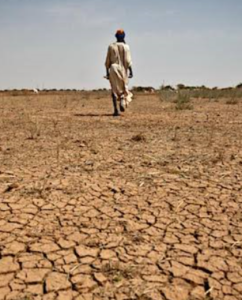Climate change and migration present challenges and opportunities – IOM
Climate change should be embedded in global protocols and approaches to migration, the UN’s migration agency IOM has said.
IOM has urged “a strategic approach to climate-driven migration that supports adaptation and resilience”.
The call came at the Second Africa Climate Summit (ACS2), in Addis Ababa, where more than 25,000 delegates, including African leaders and experts, are meeting to address the continent’s urgent climate priorities.
The meeting comes as the African continent confronts some of the world’s most pressing climate challenges characterised by record droughts.
IOM Chief of Staff Mohammed Abdiker said a new approach was needed in addressing the dual but related issues of migration and climate change.
“Climate-induced mobility presents not only challenges but also opportunities to shape Africa’s future,” he said.
“IOM’s research shows that when migration is integrated into climate action, cities can become spaces of innovation and inclusion, offering people safer livelihoods and stronger social cohesion. Harnessing these opportunities is key for Africa to lead with solutions that reflect its realities and ambitions.”
Africa is responsible for less than 4 per cent of global emissions, yet it is among the most heavily impacted by climate change. Rising droughts, floods, and environmental degradation are driving displacement across the continent, leaving millions vulnerable. 
IOM has urged a shift in perspective, positioning human mobility as a catalyst for adaptation and sustainability.
“This approach aligns with the Organization’s Continental Strategy for Africa 2025–2029, which prioritizes African-led, evidence-based solutions for building community resilience,” Mr Abdiker said.
The conference heard climate change acts as a risk multiplier for conflict and displacement in regions such as the Sahel, the Horn of Africa and the Lake Chad Basin.
“We need to stop seeing climate, mobility, and security as separate issues,” said Rania Sharshr, IOM’s Director of Climate Action.
“Together with the African Union and partners, IOM is showing that when managed inclusively, human mobility can be more than a coping mechanism – it can be a driver of peace and climate-resilient development,” he said.
Summit events included discussions with policymakers, partners, and groups such as the African Group of Negotiators on Climate Change.
Topics ranged from climate policy and regional cooperation to urban adaptation.
There was also a high-level ministerial dialogue on climate, conflict, migration, and cross-border cooperation.
Other sessions focused on migration’s role in peacebuilding, strengthening displacement preparedness, and ensuring meaningful youth engagement in policy processes.
IOM called for resources and inclusive decision-making to match ambition. It also advocated for inclusive climate finance and the meaningful representation of migrants in global forums ahead of COP30.
“We also want to emphasize the leadership of women and youth in resilience-building efforts and championing mobility as a driver of Africa’s innovation and sustainable development in the face of growing climate challenges,” Mr Abdiker said.












